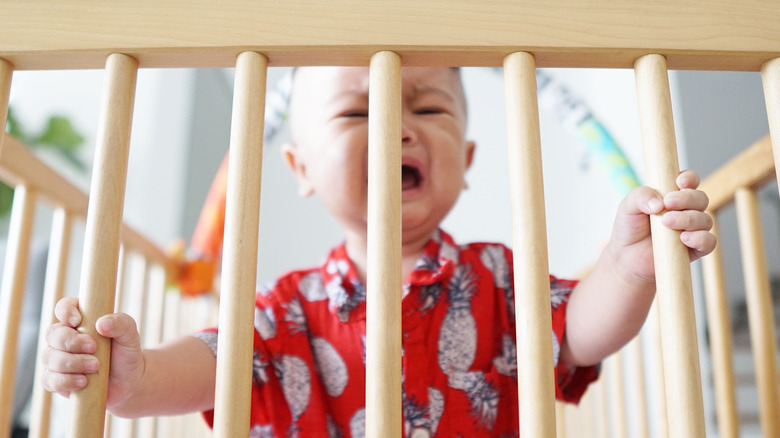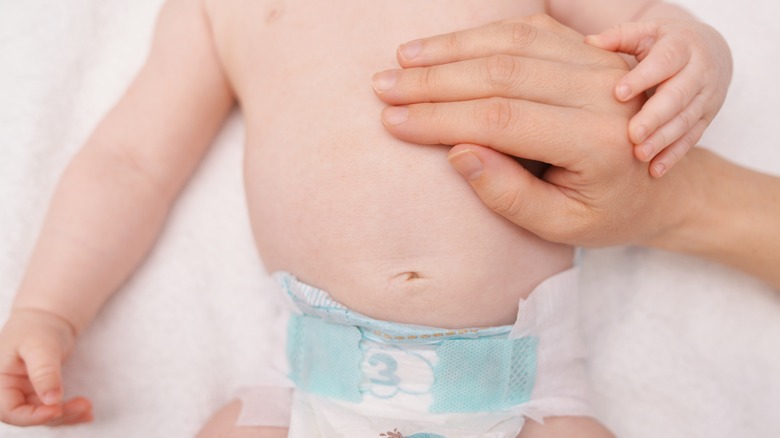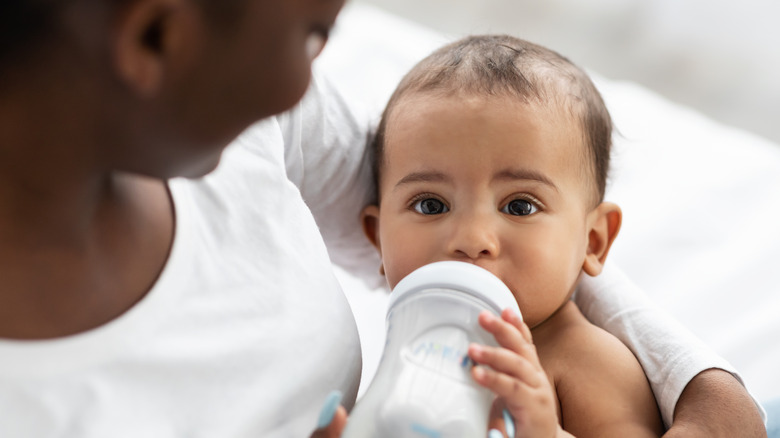Colic Explained: Causes, Symptoms, And Treatments
A baby's cry usually signals that they need something they aren't getting at the moment, whether that's food, sleep, or comfort. It's also a sign that something might be wrong, like feeling too hot or cold or feeling sick. Crying is a normal part of a baby's life — and an important one to let caregivers know that an infant has a need that isn't being met.
However, frequent, intense crying can be extremely difficult for parents to manage. Consistent crying could signify colic, a word most new parents dread. Pediatrician Morris Wessel was a leader in identifying colic and helping parents soothe their colicky babies. In 1954, Wessel wrote a paper describing how he defines colic based on three criteria: crying for more than three hours a day and more than three days a week over longer than a three-week period. To date, there are no cemented diagnostic criteria for colic, but many pediatricians use Wessel's general guide when helping parents with colicky babies (per The Washington Post).
Based on Wessel's colic criteria, as many as 25% of babies could receive a colic diagnosis (per the American Pregnancy Association). Here's what we know about colic, including possible causes, symptoms, and treatments to relieve symptoms.
Personality and temperament could influence colic
Colic is still somewhat of a mystery, even to child experts. However, many agree that a child's temperament or personality may be one of the most significant factors in influencing the development of colic. For instance, babies who are more sensitive to routine changes or environmental triggers, like lights and sounds, could be more prone to having colic than babies who can handle these stressors better. A baby struggling to adapt to anything that seems unusual or stressful to them may show their anxieties through colic (via Stanford Children's Health).
A 2022 study published in BMC Pediatrics examined the relationship between colicky babies and their personalities later in life. Parents with colicky babies were likelier to report that their infants were fussy and had sleeping problems than parents with non-colicky babies. Furthermore, mothers of babies with colic noted that from 6 months to 5 years old, their child had a challenging temperament. Researchers concluded that colic could be a regulatory problem that often occurs in babies with other behavioral and temperamental difficulties.
Gas is a common trigger for colic
Although the jury is still out on whether gas causes colic in babies, it may contribute to colic symptoms. The Children's Hospital of Philadelphia states that gas caused by intestinal bacteria could contribute to colic, causing a baby to become fussier than usual. However, Johns Hopkins Medicine also clarifies that there isn't enough solid evidence to prove that gas directly causes colic. Still, babies with colic may gulp a lot of air when crying, which could lead to extra gas in their digestive system, causing a cycle of colic symptoms and gas.
How do you know whether it's gas or colic? Mylicon says that gas typically causes a swollen belly. Your baby may also arch their backs or stiffen their legs as they try to pass gas on their own. Once they do, they will probably give you some relief from their cries. In contrast, colicky babies may continue to cry or be fussy even after removing excess gas from their bellies.
Some babies with milk allergies may develop colic
According to NHS, babies with an allergy to cow's milk may show several symptoms, like skin rashes and runny nose. Of course, this type of allergy can also lead to digestive problems, including diarrhea, stomach ache, and, as a result of an upset tummy and discomfort, colic.
Healthy Children reports that about 80% of the formulas on the market are cow's-milk-based. Modern processing methods have made cow's milk formula safer for many infants by creating more digestible versions. However, some babies could be more sensitive to it, with approximately 7% of babies under age one developing an allergy to cow's milk (via NHS).
In addition to those listed by NHS, common symptoms of a cow's milk allergy include frequent reflux or spit-up, discolored bowel movements, breathing difficulties, and in severe cases, anaphylaxis. If you suspect that a cow's milk allergy could be contributing to your baby's colic, speak with their pediatrician to determine the best diet pathway (via Enfamil).
Colicky babies might not be able to self-soothe
Self-soothing is a crucial part of a baby's development. Babies who can self-soothe can typically help themselves fall asleep or calm down when upset. Pathways reports that babies usually learn this skill by the time they reach six months.
A baby that's not as adept at self-soothing could become colicky because they're not as able to relax when they're overstimulated. Environmental triggers could cause them to become upset or scared, therefore making it difficult for their nervous system to remain in control (via Children's Hospital of Philadelphia).
If self-soothing seems to be the culprit for your baby, work with your baby to help them learn to self-soothe. First, take care of your baby's basic needs, such as feeding, diapering, bathing, and rocking, which can comfort them and make it easier for them to relax. Baby massage, using a pacifier, and trying different methods of holding, talking, and giving attention to your baby are also good ways to work toward self-soothing (per Healthy Children).
Improper feeding might lead to colic
If your baby is hungrier than usual or you're feeling rushed, they might drink from a bottle quickly, which could lead to overfeeding. When overfeeding happens, a baby could end up taking in a lot of air while sucking, leading to excess gas that could contribute to colic symptoms.
If gas or an upset stomach after eating seems to be an issue for your baby, make sure you're burping them after feedings. KidsHealth suggests burping babies who get fussy during feedings by stopping to burp every 2-3 ounces for formula-fed babies or burping between breast switches for breastfed babies.
Breastfed babies may also experience colic symptoms when specific issues arise. For instance, some mothers may experience overactive letdowns when they haven't emptied their breastmilk in a while. When this occurs, their milk could travel fast and forcefully into the baby's mouth, causing them to drink quickly and gulp air. A mother's diet can also affect breastmilk. Babies with allergies or intolerances to food their mother eats could also lead to common symptoms of colic, like extreme fussiness (via Verywell Family).
Stressed? Your baby might feel it, too
Medical experts have suggested that a mother's stress could affect a baby, whether still in the womb or already born. "When the mother is stressed, several biological changes occur, including elevation of stress hormones and increased likelihood of intrauterine infection," says Dr. Pathik Wadhwa (via WebMD), an assistant professor of behavioral science, obstetrics, and gynecology. "The fetus builds itself permanently to deal with this kind of high-stress environment, and once it's born, may be at greater risk for a whole bunch of stress-related pathologies."
Some believe that stress could even have an influence on colic in babies. A study published in the Scandinavian Journal of Public Health studied self-reported psychological and psychosocial factors, like anxiety and living apart from the child's father, affecting pregnant women. Researchers interviewed the mothers again when their babies were five weeks old to assess colic symptoms. Ultimately, they found that a mother's high trait anxiety was significantly related to the development of colic symptoms in their newborns.
What increases the risk of colic?
Do you wonder why some babies develop colic and others don't? Medical experts are still trying to determine all the ins and outs of this somewhat mysterious condition. According to the Mayo Clinic, researchers have studied the relationship between biological sex, type of feeding method, and pre-term pregnancies and colic development, but have yet to make conclusive connections.
However, some experts believe that smoking during or after pregnancy could increase the risk. According to an article published in Environmental Health Perspectives, researchers at Brown University reviewed more than 80 scientific papers, and found that women who smoked were twice as likely to have a colicky baby. Additionally, smoke exposure increased the blood concentration of a gut protein called motilin in babies. Research from the reviewed papers suggested that higher-than-average motilin concentrations were related to a higher colic risk.
Interested in quitting? Be careful how you do it. Another study (via MedicineNet) found that nicotine replacement therapies used during pregnancy may also increase the risk of colic.
Colic symptoms include more than just crying
Crying is the staple symptom that many parents think of when they think of a colicky baby. And although crying is a primary part of a colic diagnosis, it's not the only symptom that doctors will use to determine whether a baby has colic. After all, crying is a normal part of infancy in most cases.
In addition to frequent, prolonged crying, colicky babies might exhibit symptoms of gas, like burping or passing gas frequently. A tight belly, curled legs or clenched fists during periods of crying, and a flushed face could also indicate colic (via Johns Hopkins Medicine).
The Mayo Clinic also reports that episodic crying could be a symptom of colic. In other words, if your baby tends to have long periods of crying around the same time each morning after waking and again in the afternoon and evening, they might be colicky. Additional symptoms that are common in babies with colic include extreme fussiness even during periods of not crying and overall body tension (especially when upset).
Probiotics may relieve symptoms of colic
If you're looking for some relief from colic symptoms for your baby, you might try giving them probiotics under the direction of their pediatrician. Research shows some promise for the use of probiotics like Lactobacillus, Bifidobacterium, and Streptococcus in babies with colic to balance out gut flora. An article published in a 2019 edition of Cochrane Library reports that gut flora in colicky babies differs from that of non-colicky babies. A study included in the article found that daily crying reduced with the use of probiotics compared to a placebo.
Research published in American Family Physician notes that Lactobacillus reuteri can be especially helpful for breastfed infants with colic. The authors reviewed studies using this probiotic and found that four out of five clinical trials reported improved colic symptoms from its use. Furthermore, three studies and reviews found that the probiotic "significantly decreased colic" in breastfed infants, reducing their crying time by 61 minutes a day.
Medications for symptomatic treatment of colic
So far, medications to stop or prevent colic in babies are non-existent. However, some medications have shown promise in relieving (or at least reducing) common colic symptoms. If you have a colicky baby, your pediatrician might recommend pain-relieving medications that could curb some of the discomfort your baby feels if they have excess gas or other intestinal troubles.
A 2016 review in Cochrane Library summarized the findings of 18 controlled trials with more than 1,000 babies with colic. The studies focusing on herbal agents that reduce bowel cramps and pain seemed to show the most promise, generally reducing a baby's overall crying time. Dicyclomine hydrochloride, a drug designed for intestinal cramping and discomfort, has also shown to be effective in improving colic symptoms in clinical trials. However, its risk of potentially serious side effects, like seizures and breathing problems, has mostly deterred its use in infants (via Medscape). WebMD states that babies older than six months of age may be able to benefit from this medication.
Dietary changes could improve colic symptoms
Although some remedies for colic don't quite have enough evidence to prove that they're effective, there's one that seems to have a lot of research-backed proof: making dietary changes.
Milk allergies could provoke colic in babies. If they formula-feed, a milk-based formula could be the culprit. Kids With Food Allergies reports that extensively hydrolyzed formulas and amino acid-based formulas could be the best options for babies with cow's milk allergies who eat formula rather than breastmilk.
For breastfed babies, it's mostly up to the mother to reduce allergens in her diet, as the foods she eats can make their way into breastmilk. A scientific review in American Family Physician states that a low-allergen diet of breastfeeding mothers led to "significant reductions in colic symptoms." The diet included excluding common allergens, like soy, cow's milk, and eggs. The authors add that breastfeeding mothers who see a difference in their colicky babies following a low-allergen diet can attempt to return to their usual diets when their baby reaches 3-6 months old.
Soothing a colicky baby
Perhaps the most important part of reducing colic symptoms in babies is knowing how to soothe them when they're upset. While it can seem almost impossible in the midst of a crying episode, it's all about trying different soothing methods and seeing what works best for your baby.
The best soothing methods depend on why your baby usually enters into periods of crying. For gassy babies, giving them an extra burp during feedings or applying gentle pressure to their tummy might soothe their pain (via What to Expect). Babies who have a hard time self-soothing might respond well to having a pacifier or getting rocked to sleep. Playing relaxing music can also reduce fussiness in some babies. Swaddling with a cozy blanket might also do the trick. Some babies simply want more closeness from a loved one to feel safe and chill. Try giving extra cuddles, wearing your baby, or holding your baby more often if it seems to calm them.
Reducing overstimulation for babies with colic
With overstimulation being a prime contributor to colic in some babies, parents should know a few tricks to help prevent their little ones from becoming overstimulated by their environment.
Overstimulation can happen when there's a lot of noise, lights, things to see, or people around your baby. Some babies simply handle overstimulation better than others, but those who can't could become fussy and irritable very quickly in these situations. According to Raising Children, swaddling newborns or carrying them close to you in a sling can help when you aren't able to remove your baby from the overstimulating environment, like at a family gathering or restaurant. Otherwise, it's best to take your baby somewhere away from the stimuli, like their bedroom or a bassinet in another room. What to Expect also suggests trying to limit overstimulation if you notice that it's a problem for your baby. For example, you might only have one or two visitors at a time rather than a large group of people.
Take care of your needs, too
Dealing with colic can be incredibly stressful on parents and caregivers, which is why it's crucial to take care of yourself, too. In fact, an article published in a 2019 edition of the Singapore Medical Journal gives guidance for pediatricians on how to approach the subject of colic with parents. One of the topics it covers is parental support, explaining it as the "mainstay of therapy" for colic. Two suggestions the authors recommend giving parents are to partake in social support groups and to "take adequate breaks from caregiving" to focus on their own needs away from their babies.
The Mayo Clinic offers a few more ways for parents to prioritize their needs and prevent parental burnout. First, take turns with baby-duty responsibilities with a partner, relative, or another trusted individual. If possible, have an emergency person, like a trusted friend or grandparent, available for times when you need a spur-of-the-moment break. Lastly, don't feel bad putting your baby safely in their crib for a little bit if you need to step away for a few minutes.















